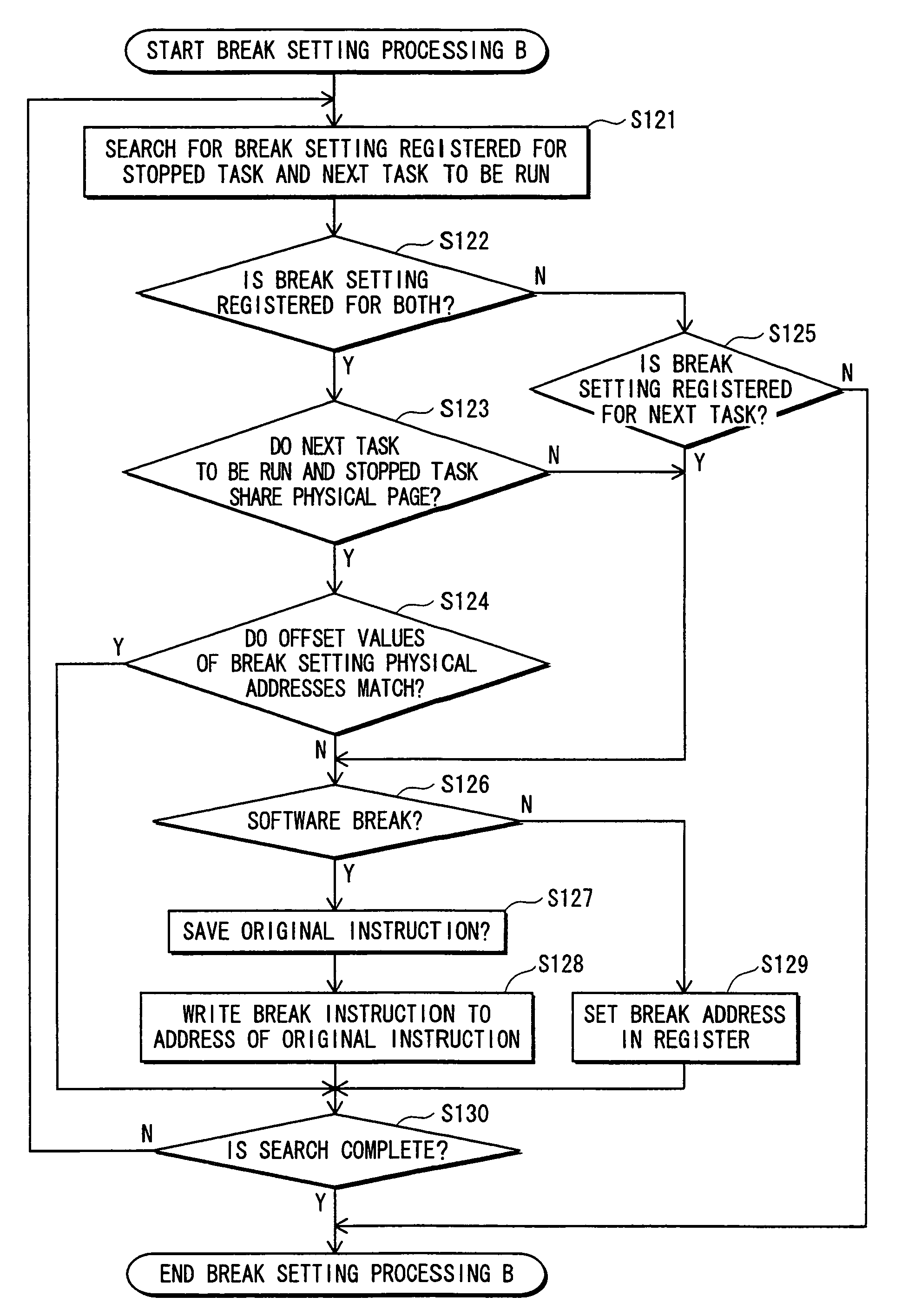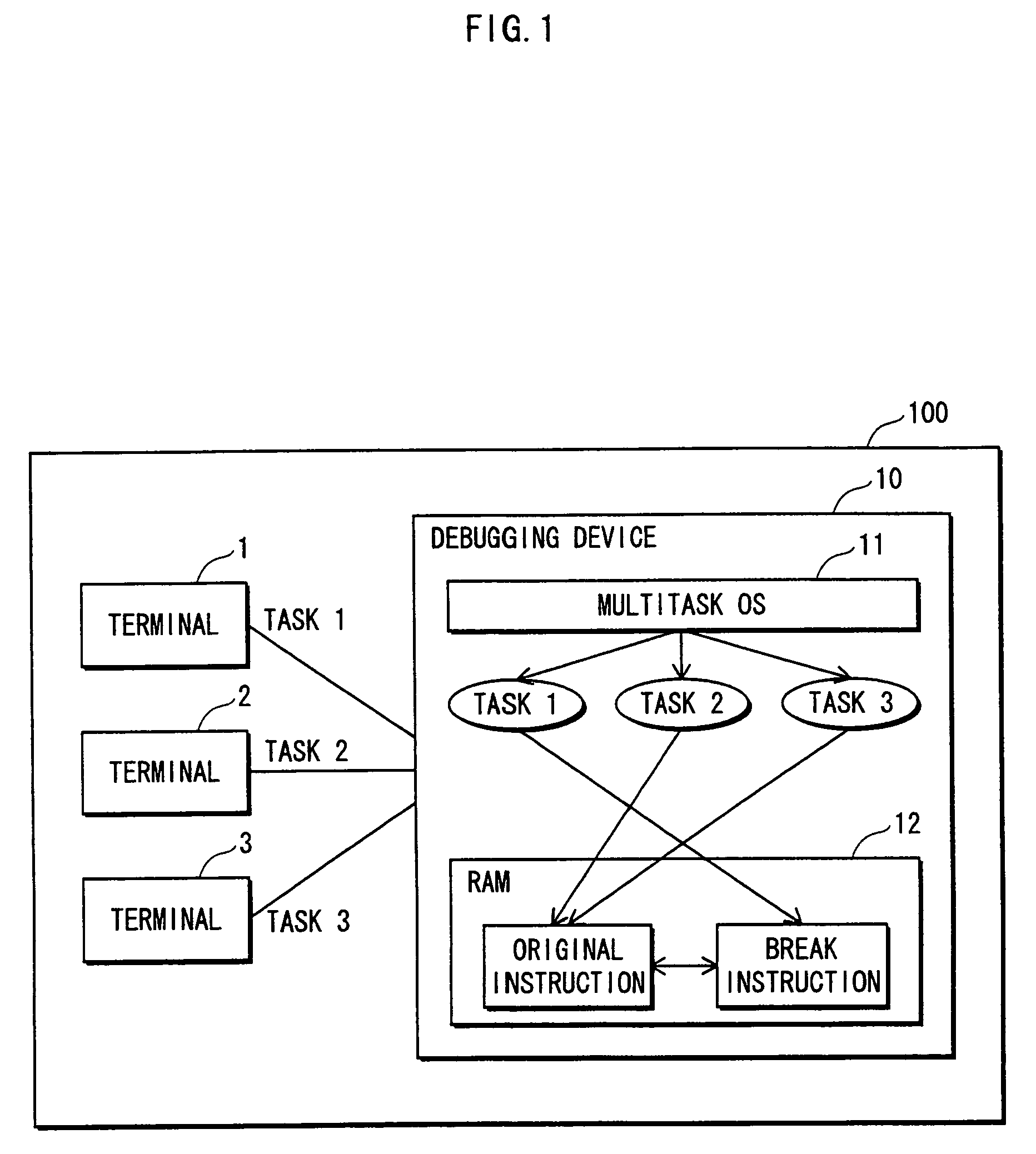Debugging system and method
a multitask environment and debugging system technology, applied in the field of multitask environment debugging system and method, can solve the problems of increasing the complexity of software embedded in such systems, affecting the operation of tasks, and failure of running tasks, so as to reduce the processing load required for debugging cancellation processing
- Summary
- Abstract
- Description
- Claims
- Application Information
AI Technical Summary
Benefits of technology
Problems solved by technology
Method used
Image
Examples
first embodiment
Structure
Structure of Debugging System
[0057]FIG. 1 is a function block diagram showing the structure of a debugging system 100 relating to the present embodiment. The debugging system 100 is composed of terminals 1 to 3 and a debugging device 10.
[0058]The terminals 1 to 3 are connected to the debugging device 10 with respective communication lines. Each of the terminals 1 to 3 has a function of outputting various commands to the debugging device 10 via the respective communication line, receiving a processing result from the debugging device 10 based on the particular output command, and displaying the result on a display unit (not illustrated).
[0059]The debugging device 10 has a function of loading an application program to a physical address space in a RAM 12 in accordance with an application program execution command from any of the terminals 1 to 3, executing a task by executing the application program under the control of a multitask OS 11, and transmitting the execution result...
second embodiment
[0111]In the debugging system 100 of the first embodiment, break setting processing and break cancellation processing are performed each time a tasks witch occurs. However, in a debugging system 200 of the second embodiment, when a break setting has been made for the next task to be run that is the same as the break setting for the directly preceding stopped task, break setting processing and break cancellation processing when task switching occurs are omitted. This enables task switch processing to be performed quickly. Note that the debugging system 200 differs from the debugging system 100 of the first embodiment only in terms of structure described below, and other compositional elements are identical. Consequently, a function block diagram showing the structure of the debugging system 200 is omitted. This also applies to debugging systems 300, 400 and 500 described later.
Structure
[0112]The following omits a description of the compositional elements that are the same as in the d...
third embodiment
[0135]In the debugging system 100 of the first embodiment, break setting processing and break cancellation processing are performed each time a task switch occurs. However, in the debugging system 300 of the third embodiment, when a task switch occurs, all break settings registered in the break setting table are performed first, and then all of the break settings whose physical address differs from that of the task to be run next are cancelled.
Structure
[0136]The following omits a description of the compositional elements that are the same as in the debugging system 100 in the first embodiment, and focuses on those that differ.
Structure of Debugging Device 30
[0137]FIG. 23 is a function block diagram showing the structure of a debugging device 30 included in the debugging system 300. The debugging device 30 is composed of a multitask OS unit 301, a break setting unit 302, a break cancellation unit 303, the communication unit 104, the application storage unit 105, the page table storag...
PUM
 Login to View More
Login to View More Abstract
Description
Claims
Application Information
 Login to View More
Login to View More - R&D
- Intellectual Property
- Life Sciences
- Materials
- Tech Scout
- Unparalleled Data Quality
- Higher Quality Content
- 60% Fewer Hallucinations
Browse by: Latest US Patents, China's latest patents, Technical Efficacy Thesaurus, Application Domain, Technology Topic, Popular Technical Reports.
© 2025 PatSnap. All rights reserved.Legal|Privacy policy|Modern Slavery Act Transparency Statement|Sitemap|About US| Contact US: help@patsnap.com



